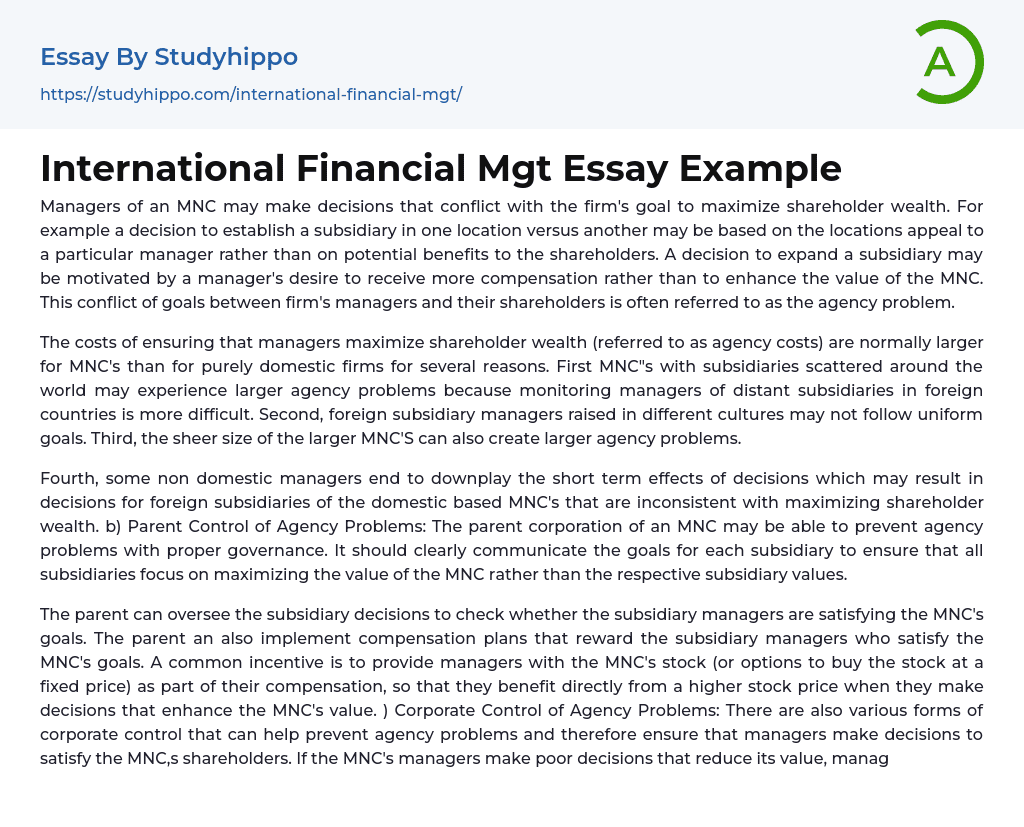Managers of an MNC may make decisions that conflict with the firm's goal to maximize shareholder wealth. For example a decision to establish a subsidiary in one location versus another may be based on the locations appeal to a particular manager rather than on potential benefits to the shareholders. A decision to expand a subsidiary may be motivated by a manager's desire to receive more compensation rather than to enhance the value of the MNC. This conflict of goals between firm's managers and their shareholders is often referred to as the agency problem.
The costs of ensuring that managers maximize shareholder wealth (referred to as agency costs) are normally larger for MNC's than for purely domestic firms for several reasons. First MNC"s with subsidiaries scattered around the world may experience larger agency problems because monitoring managers of distant subsidiaries
...in foreign countries is more difficult. Second, foreign subsidiary managers raised in different cultures may not follow uniform goals. Third, the sheer size of the larger MNC'S can also create larger agency problems.
Fourth, some non domestic managers end to downplay the short term effects of decisions which may result in decisions for foreign subsidiaries of the domestic based MNC's that are inconsistent with maximizing shareholder wealth. b) Parent Control of Agency Problems: The parent corporation of an MNC may be able to prevent agency problems with proper governance. It should clearly communicate the goals for each subsidiary to ensure that all subsidiaries focus on maximizing the value of the MNC rather than the respective subsidiary values.
The parent can oversee the subsidiary decisions to check whether the subsidiary managers are satisfying the MNC's goals.
The parent an also implement compensation plans that reward the subsidiary managers who satisfy the MNC's goals. A common incentive is to provide managers with the MNC's stock (or options to buy the stock at a fixed price) as part of their compensation, so that they benefit directly from a higher stock price when they make decisions that enhance the MNC's value. ) Corporate Control of Agency Problems: There are also various forms of corporate control that can help prevent agency problems and therefore ensure that managers make decisions to satisfy the MNC,s shareholders. If the MNC's managers make poor decisions that reduce its value, managers. In addition, institutional investors such as mutual funds or pension funds that have large holdings of an MNC's stock have some influence over management because they can complain to the board of directors if managers are making poor decisions.
They may attempt to enact changes in a poorly performing MNC, such as the removal of high-level managers or even board members. The institutional investors may even work together when demanding changes in an MNC would not want to lose all of its major shareholders. II. The commonly held theories as why firms become motivated to expand their firms nternationally are 1) Theory of comparative advantage 2) Imperfect markets theory 3) Product cycle theory.
The theories overlap to a certain degree and can complement each other in developing a rationale for the evolution of international business. a) Theory Of Comparative Advantage Multinational business has generally increased overtime. Part of this growth is due to the heightened realization that specialization by countries can increase production efficiency. When a country specializes in
some products, it may not produce other products, so trade between countries is essential. This is the argument made by the lassical theory of comparative advantage. ) Imperfect Markets Theory If each countrys markets were closed from all other countries, there would be no international business. At the other extreme, if markets were perfect, so that the factors of production (such as labour) were easily transferable, then labour and other resources would flow wherever they were in demand. The unrestricted mobility of factors would create equality in cost and returns and remove the comparative cost advantage, the rationale for international trade and investment.
However the real world suffers from imperfect market conditions where factors of production are omewhat immobile. Imperfect markets provide an incentive for firms to seek out foreign opportunities. c) Product cycle theory According to this theory firms become established in the home market as a result of some perceived advantage over existing competitors, such as a need by the market for at least one more supplier of the product.
Because information about markets and competitors is more readily available at home a firm is likely to establish itself first in its home country. Foreign demand for the firm's product will initially be accommodated by exporting. As time passes the firm may feel the only way to retain ts advantage over competition in foreign countries is to produce the products in foreign markets, thereby reducing its transportation costs. The competition in the foreign markets may increase as other producers become more familiar with the firm's product.
- Money essays
- Financial Accounting essays
- Market Segmentation essays
- Supply And Demand essays
- Purchasing essays
- Forecasting essays
- Legacy essays
- Bank essays
- Corporate Finance essays
- Financial News essays
- Financial Ratios essays
- Financial Services essays
- Free Market essays
- Shareholder essays
- Personal finance essays
- Equity essays
- Financial Crisis essays
- Banking essays
- Credit Card essays
- Currency essays
- Debt essays
- Gold essays
- Loan essays
- Enron Scandal essays
- Foreign Exchange Market essays
- Investment essays
- Venture Capital essays
- Stock Market essays
- Retirement essays
- Donation essays
- Net Present Value essays
- Income Statement essays
- Commercial Bank essays
- Debit Card essays
- Deposit Account essays
- Subprime Lending essays
- Perfect Competition essays
- Underwriting essays
- Synergy essays
- Valuation essays
- Investing essays
- Asset essays
- Depreciation essays
- Discounted Cash Flow essays
- Foreign Direct Investment essays
- Funds essays
- Internal Rate Of Return essays
- Revenue essays
- Day Trading essays
- Futures Trading essays




